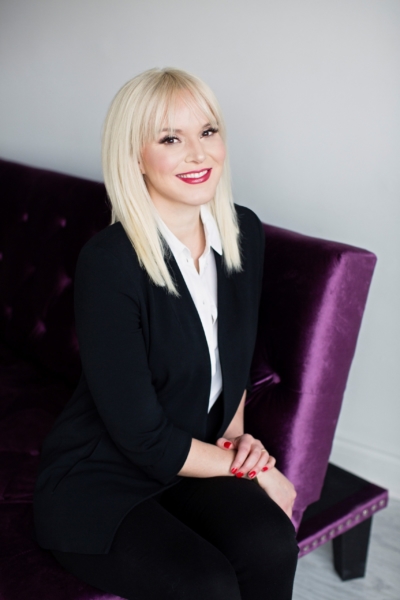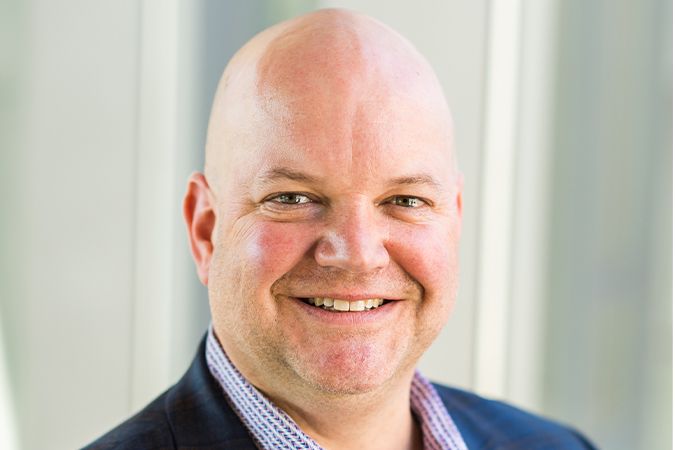
facts, myths
You wouldn’t think anything could faze Taya Cook. After all, she has thrived in the rough-and-tumble world of real estate, spearheading condominium development projects across Canada. Her work has even drawn attention from outlets ranging from the New York Times to Oprah Magazine. Two years ago, Cook was fretting after making a life-changing decision. She was starting her executive MBA program at the University of Toronto’s Rotman School of Management. Despite her achievements, she wondered if she was up to the challenge.
“I had a fear that everyone else would be smarter or better at certain things,” she tells Poets&Quants. “I worried that I’d fail classes and be embarrassed or I wouldn’t make friends (seriously). Classrooms can still be intimidating to even the most confident person. Everyone feels the same going in to it.”

Taya Cook, University of Toronto’s Roman School
PICK YOUR BATTLES
Turns out, Cook’s worries were overblown. What type of impression did she make on her MBA classmates? They voted her the winner of Rotman’s Social Impact Award – given to a student who “challenges the cohort in the areas of equality, diversity, and raising awareness around social issues.” She was described as a “thoughtful leader” by John Oesch, academic director for the Rotman EMBA. In class, he says, Cook sparked conversations and incorporated all viewpoints. And her timely comic relief proved invaluable too!
For Cook, MBA success required two qualities that often promote career success: humility and poise.
“Yes, people may be WAY smarter than you at certain things, but there will be something that you’re better than them at (even if it’s just staying calm and not stressing),” she adds. “Throughout the year, it all evens out.”
That’s not to say the EMBA can’t be overwhelming at times. That’s what Cook’s classmate, Kathryn Tinckam, had heard. Turns out, that observation wasn’t a myth. In response, Tinckam – a medical director and EMBA class valedictorian – embraced a mentality that ran counter to how she’d previously approached student life.
“At some point in adult learning, you have to drop the undergrad expectation of learning everything, prioritize what is going to be the most useful for you, and accept “good enough” for everything else,” she admits. “It’s about choices.”
OVERCOMING THE FEAR
In some cases, EMBAs actually viewed being “overwhelmed” as a good thing. Just ask Jesse Breidinger. A senior manager at Coca-Cola and mother, Breidinger founded herself overwhelmed in the best possible way at Georgia Tech’s Scheller College.
“I was overwhelmed with new ideas and how I wanted to redesign my life. I was overwhelmed by the massive shift in my mindset that is invaluable for planning out the rest of my business endeavors and overall lifestyle for the future. In addition, I never felt overworked. I chose to work a bit harder to get everything out of the program. Personally, I believe the workload is balanced with the lifestyle of a working professional.”

Sasha Schechter, Columbia Business School
Yes, there are plenty of myths about executive MBA programs. You’re too old. You’re too busy. It’s too much work. However, these myths – like any myth – are designed to set limits and justify fear. They free people from making the choices and taking the risks that spur growth. These fears are exactly what MBA lessons dispel…in the classroom and the workplace.
“I think that fear comes from a history of succeeding in jobs where it’s our responsibility to be right often as possible,” adds Columbia Business School’s Sasha Schechter. “Going back to school requires you to thrive in the moments when you’re wrong; that’s when growth occurs, and when learning takes place.”
Each year, Poets&Quants honors 100 of the most accomplished Executive MBAs – the Best & Brightest –
from the top business schools. This year, as part of the nomination process, we asked these 2020 graduates to share the biggest myths about EMBA programs…and how they fit with reality. From grades to timing, here are 12 myths you’ll encounter about graduate business education.
1) It will be the same as undergrad: “Being at business school is a whole different experience. I went in with my student mind-set and was initially so focused on the academic teaching, assignments, and grades. But I fast realised that doing an EMBA at this level is not about the theoretical learnings – It’s about the rich discussion in class and the engagement with my professors, who don’t treat you like a student but rather as a peer. It’s about the relevance and application in my real-life and not about acing the grades on an assignment. It’s not about proving what you know or how smart you are, but rather about being vulnerable in that which you don’t so that you can learn and grow. I’m not sure if this is a result of age and maturity, or the environment deliberately created at business school level – or perhaps both – but being back at school was nothing like I thought it would be.”
Hema Vallabh, University of Oxford (Saïd)
2) You can get by with do the minimum amount of work: “Personally, I could not find a way to do things “half-way”. When you go back to school at this point in your career, the learnings are more immediately applicable and tangible and you are much more motivated to really understand concepts not only for yourself but also for your work colleagues.”
Rosalie Villapando, University of Michigan (Ross)

Andrew Surwilo, MIT Sloan
“It will consume a large amount of time. However, my experience is that you begin applying the learnings almost immediately which makes the education and practical application of the learning uniform throughout the course of study. I cannot identify one case, lecture, or assignment that wasn’t useful almost immediately.”
Andrew Surwilo, MIT (Sloan)
“There is a myth that, “An executive MBA is made for busy executives and thus can’t require much outside of the classroom – we’re not undergrads or graduate students – we have real jobs.” My first thought was, “I’m a neurosurgeon, how hard can this be? I like to think I’m intelligent, organized, driven and work hard. I survived residency and consistently work over 80 hours a week and am still a very involved mother.
Boy, was I wrong.
I probably spent 10-20 hours a week on my MBA assignments and projects. Getting busy professionals together meant we had conference calls after 9 p.m. twice a week. I would get up at 5 a.m. to start my day and be home around dinner time. Family time was between dinner and bedtime for the kids. After they went to sleep, I either went back to work, got on a conference call with my MBA group or worked on my assignments until after midnight and finally went to sleep. I then did it all over again the next day. Every day seemed like ‘groundhog day.’”
Michele M. Johnson, University of Georgia (Terry)
3) You only get an MBA if you want a new job: “One of the questions I hear over and over again as a surgeon is “What are you going to actually do with an MBA?” I think the biggest myth is that there has to be a specific job position you want to attain or it’s not worth doing at all. I use the skills and knowledge from my MBA program every single day in virtually every aspect of my work. It’s not just a stepping stone to the next job role—and you may find the MBA opens your mind to opportunities that you wouldn’t have previously considered.”
Kimberly Lumpkins, M.D., University of Maryland (Smith)





Questions about this article? Email us or leave a comment below.